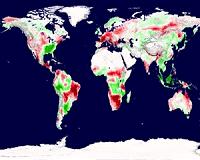| . |  |
. |
Washington (AFP) Oct 19, 2010 Large swathes of the planet could experience extreme drought within the next 30 years unless greenhouse gas emissions are cut, according to a study released Tuesday. "We are facing the possibility of widespread drought in the coming decades, but this has yet to be fully recognized by both the public and the climate change research community," said National Center for Atmospheric Research (NCAR) scientist Aiguo Dai, who conducted the study. "If the projections in this study come even close to being realized, the consequences for society worldwide will be enormous," he said. Parts of Asia, the United States, and southern Europe, and much of Africa, Latin America and the Middle East could be hit by severe drought in the next few decades, with regions bordering the Mediterranean Sea seeing "almost unprecedented" drought conditions, the study says. "Severe drought conditions can profoundly impact agriculture, water resources, tourism, ecosystems, and basic human welfare," says the study, published in Wiley Interdisciplinary Reviews: Climate Change. In the United States, drought causes six to eight billion dollars in damages a year on average, and drought-related disasters killed more than half a million people in Africa in the 1980s, the study says. While vast areas of the world will become extremely dry for long periods, higher-latitude regions from northern Europe to Russia, Canada, Alaska and India could become wetter. Increased moisture in those regions would not, however, make up for the drier conditions across much of the rest of the world. "The increased wetness over the northern, sparsely populated high latitudes can't match the drying over the more densely populated temperate and tropical areas," Dai said. Dai used results from 22 computer models used by the Nobel Prize-winning Intergovernmental Panel on Climate Change (IPCC), to make projections about temperature, precipitation, humidity and other climate factors based on current projections of greenhouse gas emissions. Maps of the world that Dai produced using the data show "severe drought by the 2060s over most of Africa, southern Europe and the Middle East, most of Americas (except Alaska and northern Canada, Uruguay, and northeastern Argentina), Australia, and Southeast Asia," the study says. The maps also show that most of central and northern Eurasia, Alaska and northern Canada, and India would become wetter over the same period. The study's predictions are based on current projections of what greenhouse gas emissions will be this century. What actually happens in the next few decades will depend on several factors, including the actual future level of greenhouse gas emissions and natural climate cycles such as El Nino, which often reduces precipitation over low-latitude land areas. The study follows on from earlier research, including by Dai and the IPCC, that found that global warming will probably alter precipitation patterns as the subtropics expand.
Share This Article With Planet Earth
Related Links Climate Science News - Modeling, Mitigation Adaptation
 Drought Drives Decade-Long Decline In Plant Growth
Drought Drives Decade-Long Decline In Plant GrowthMissoula MT (SPX) Aug 26, 2010 Earth has done an ecological about-face: Global plant productivity that once flourished under warming temperatures and a lengthened growing season is now on the decline, struck by the stress of drought. NASA-funded researchers Maosheng Zhao and Steven Running, of the University of Montana in Missoula, discovered the global shift during an analysis of NASA satellite data. Compared with a si ... read more |
|
| The content herein, unless otherwise known to be public domain, are Copyright 1995-2010 - SpaceDaily. AFP and UPI Wire Stories are copyright Agence France-Presse and United Press International. ESA Portal Reports are copyright European Space Agency. All NASA sourced material is public domain. Additional copyrights may apply in whole or part to other bona fide parties. Advertising does not imply endorsement,agreement or approval of any opinions, statements or information provided by SpaceDaily on any Web page published or hosted by SpaceDaily. Privacy Statement |